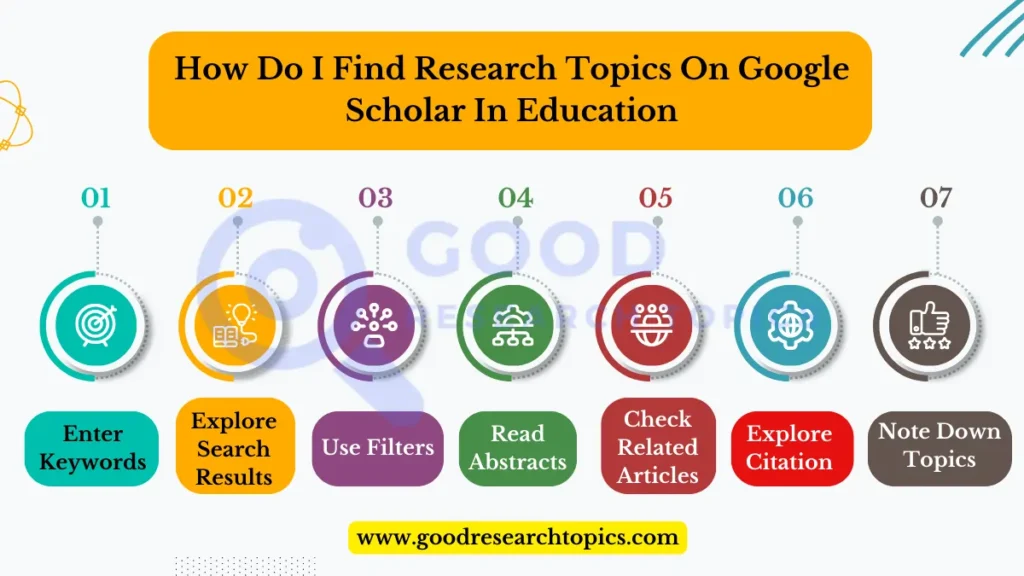Have you ever wondered about the fascinating Google Scholar research topics in education? Like discovering secrets to help students learn better.
Google Scholar is a powerful tool that brings together academic papers and articles from many different fields. You can use it to find Google Scholar research topics in education.
It provides researchers with access to a huge amount of information. Using Google Scholar tools for educational research is very important for teachers and scholars.
It helps them stay updated with the latest studies and methods.
In education, research topics are crucial for shaping how we teach, what we include in our curriculum, and making policy decisions.
In this blog, we will explore different education research topics available on Google Scholar, offering clear analyses and discussions to help you understand and apply this information.
Let’s explore educational research topics through the resources available on Google Scholar.
What is Google Scholar?
Google Scholar is a free search engine that helps you find scholarly articles, theses, books, and more. It’s designed to make academic research easy and accessible.
Key features
- Wide Search: Covers a range of academic materials.
- Free Access: Most content is available without a subscription.
- Citation Tracking: Shows how often papers are cited and their impact.
- Academic Focus: Prioritizes research over general web content.
Google Scholar is a go-to tool for researchers and students in all fields.
Importance of using Google Scholar for research
Google Scholar is a must-have tool for educators and researchers because of its key benefits:
- Broad Search: Access a huge range of scholarly articles, books, and abstracts all in one place.
- Free Access: Use it without any cost, giving you wide-reaching academic resources.
- Citation Tracking: Easily track citations and spot influential papers to gauge research impact.
- Time-Saving: Quickly find relevant articles and avoid information overload.
- Interdisciplinary Coverage: Explore research across various fields and topics.
- Library Integration: Many libraries provide direct access to full-text articles through Google Scholar.
Using Google Scholar effectively can significantly improve both the quality and efficiency of your research.
How to effectively use Google Scholar for education research
Here’s a simple guide on how to discover research topics using Google Scholar:

1. Enter Keywords
Visit to scholar.google.com. In the search bar, type keywords related to education.
2. Explore Search Results
Press Enter, and Google Scholar will display a list of scholarly articles, papers, and publications related to your keywords.
3. Use Filters
You can filter by year of publication, specific authors, recent articles, or specific journals.
4. Read Abstracts
These abstracts give a concise overview of what the research is about.
5. Check Related Articles
Look at the “Related articles” section or the citations of an article you find interesting.
6. Explore Citations
This can lead you to newer research or discussions related to that topic.
7. Note Down Topics
Note the titles or main themes to create a list of potential research topics for your study or exploration.
Trending Google Scholar Research Topics In Education
Finding the best Google Scholar research topics in education is very difficult. Here are the various topics related to Google Scholar in education.
Teaching and Learning Methods
Effectiveness of Active Learning Techniques
- Measure student engagement levels.
- Analyze improvement in academic achievement.
Comparative Analysis of Blended vs. Traditional Learning
- Compare test scores and grades.
- Assess student satisfaction and engagement.
Implementing Differentiated Instruction
- Identify challenges in lesson planning.
- Evaluate benefits for diverse learners.
Impact of Flipped Classrooms on Student Performance
- Measure changes in test scores.
- Assess student understanding and retention.
Gamification in Education
- Evaluate impact on student motivation.
- Analyze performance in different subjects.
Project-Based Learning
- Compare outcomes with traditional methods.
- Assess student skill development and understanding.
Role of Collaborative Learning
- Measure improvement in teamwork skills.
- Analyze impact on individual knowledge gain.
Inquiry-Based Learning
- Assess development of critical thinking skills.
- Measure impact on problem-solving abilities.
Use of Technology in Active Learning
- Evaluate effectiveness of digital tools.
- Measure student engagement and learning outcomes.
Effectiveness of Adaptive Learning Technologies
- Assess impact on personalized learning.
- Analyze improvements in student performance.
Educational Technology
Effectiveness of E-Learning Platforms
- Compare learning outcomes across platforms.
- Assess user satisfaction and engagement.
Virtual Reality in Science Education
- Evaluate improvement in understanding complex concepts.
- Measure student engagement with VR.
Gamification in Language Learning
- Assess effectiveness of game-based learning.
- Measure language acquisition and retention.
AI for Personalized Learning
- Evaluate how AI tailors learning experiences.
- Analyze improvements in student outcomes.
Mobile Learning Apps
- Measure impact on student engagement.
- Assess changes in academic performance.
Digital Tools for Collaboration
- Evaluate effectiveness in group work.
- Measure impact on project outcomes.
Blended Learning Models
- Explore various blended learning approaches.
- Assess their effectiveness in different settings.
Impact of Online Simulations
- Evaluate improvement in practical skills.
- Measure understanding of complex subjects.
Use of Augmented Reality in Education
- Assess benefits of AR in learning.
- Measure impact on student engagement.
Social Media as an Educational Tool
- Study its role in supporting learning.
- Evaluate its impact on student collaboration.
Curriculum Development
Designing STEM Curriculum
- Develop and evaluate STEM-focused materials.
- Assess impact on student STEM skills.
Inclusive Curriculum Development
- Create materials that cater to diverse needs.
- Test effectiveness in inclusive classrooms.
Interdisciplinary Curriculum Projects
- Explore integration of multiple subjects.
- Evaluate effectiveness of interdisciplinary learning.
Culturally Relevant Pedagogy Implementation
- Study incorporation of cultural materials.
- Assess impact on student engagement and learning.
Curriculum for Critical Thinking
- Develop components to enhance critical thinking.
- Assess improvements in student problem-solving skills.
Assessment-Driven Curriculum Design
- Investigate use of assessment data in design.
- Evaluate curriculum improvements based on data.
Project-Based Curriculum Design
- Create and test project-based learning materials.
- Assess effectiveness on student learning.
Curriculum Adaptations for Online Learning
- Develop adaptations for online settings.
- Evaluate impact on online learning outcomes.
Role of Teacher Input in Curriculum Development
- Study influence of teacher feedback.
- Assess changes in curriculum based on input.
Evaluating Curriculum Effectiveness
- Assess new curriculum initiatives.
- Measure improvements in student outcomes.
Educational Psychology
Motivation Strategies for Student Engagement
- Explore different motivational techniques.
- Measure impact on student engagement.
Learning Theories Application
- Investigate application of learning theories.
- Assess effectiveness in classroom settings.
Effectiveness of Feedback on Student Performance
- Study impact of feedback types on learning.
- Evaluate improvement in student performance.
Social-Emotional Learning Programs
- Assess effectiveness of SEL programs.
- Measure impact on student behavior and performance.
Growth Mindset Interventions
- Evaluate impact of growth mindset strategies.
- Measure changes in student attitudes and performance.
Impact of Teacher Expectations on Student Achievement
- Study influence of teacher expectations.
- Assess impact on student achievement.
Cognitive Development and Instruction
- Investigate how cognitive development affects teaching.
- Evaluate improvements in instructional practices.
Behavioral Management Techniques
- Explore different classroom management strategies.
- Assess their effectiveness in behavior management.
Emotional Support for Students
- Evaluate impact of emotional support on outcomes.
- Measure improvement in academic and social areas.
Stress and Academic Performance
- Study relationship between stress and performance.
- Analyze impact of stress management strategies.
Educational Policy and Administration
Impact of Education Policies on Equity
- Investigate how policies affect equity.
- Assess outcomes for different student groups.
Leadership Styles in Schools
- Study impact of various leadership styles.
- Assess effects on school performance.
Policy Changes and Their Effects
- Analyze recent policy changes.
- Measure impact on teaching and learning.
Teacher Professional Development Programs
- Evaluate different development programs.
- Assess their impact on teaching practices.
School Management Practices
- Investigate best practices in school management.
- Measure their impact on school effectiveness.
Parental Involvement in Education
- Study effects of involvement policies.
- Assess impact on student success.
Assessment and Accountability Policies
- Explore influence on educational practices.
- Evaluate impact on student outcomes.
Resource Allocation in Schools
- Examine how resources are allocated.
- Assess effect on outcomes and equity.
Impact of School Governance Structures
- Assess different governance models.
- Study their impact on school performance.
School Climate and Student Achievement
- Investigate relationship between climate and achievement.
- Measure impact of climate improvements.
Special Education
Inclusive Education Practices
- Investigate strategies for effective inclusion.
- Assess impact on student learning and participation.
Assistive Technology Effectiveness
- Evaluate various assistive technologies.
- Measure impact on learning and independence.
Behavioral Interventions in Special Education
- Study effectiveness of behavioral strategies.
- Assess improvements in behavior and learning.
Development of Individualized Education Programs (IEPs)
- Assess process and outcomes of IEPs.
- Measure effectiveness in meeting individual needs.
Social Skills Training for Students with Disabilities
- Explore impact of social skills programs.
- Evaluate improvements in social interactions.
Parental Involvement in Special Education
- Study role of parents in special education.
- Assess impact on program success.
Transition Planning for Students with Disabilities
- Evaluate strategies for transition planning.
- Measure effectiveness in post-school outcomes.
Professional Development for Special Education Teachers
- Assess impact of training on teaching practices.
- Evaluate improvements in student support.
Collaboration Between Special and General Education Teachers
- Investigate benefits and challenges of collaboration.
- Measure impact on teaching and student outcomes.
Assessment Tools for Students with Disabilities
- Evaluate effectiveness of different assessment tools.
- Measure their impact on identifying needs.
Early Childhood Education
Early Literacy Interventions
- Study impact of various interventions.
- Assess improvements in literacy skills.
Play-Based Learning Outcomes
- Investigate effects on cognitive development.
- Measure impact on social skills.
Parent Engagement in Early Education
- Explore strategies to increase parental involvement.
- Assess impact on early education outcomes.
Social-Emotional Development Programs
- Assess effectiveness of development programs.
- Measure impact on emotional and social growth.
Early Childhood Curriculum Design
- Develop and evaluate early childhood curricula.
- Assess impact on developmental milestones.
Impact of Classroom Environment on Learning
- Study effects of classroom settings.
- Measure impact on development and learning.
Teacher Training in Early Childhood Education
- Evaluate effectiveness of training programs.
- Assess improvements in teaching practices.
Screen Time and Early Development
- Investigate effects of screen time on development.
- Measure impact on cognitive and social skills.
Cultural Competence in Early Education
- Explore impact of cultural practices.
- Assess effectiveness in diverse classrooms.
Assessment Methods for Young Children
- Study effectiveness of different assessment methods.
- Evaluate impact on tracking progress.
Higher Education
Strategies for Improving Student Retention
- Analyze effective retention strategies.
- Measure impact on graduation rates.
Effectiveness of Online Learning in Higher Education
- Compare online and traditional learning outcomes.
- Assess student satisfaction with online courses.
Academic Advising Practices
- Evaluate impact of advising practices.
- Measure effectiveness on student success.
Campus Diversity Initiatives
- Investigate effects of diversity programs.
- Assess impact on campus climate and outcomes.
Student Support Services
- Assess effectiveness of support services.
- Measure impact on student success and well-being.
Impact of Work-Integrated Learning
- Explore effects on career readiness.
- Measure impact on employment outcomes.
Student Financial Aid and Academic Performance
- Study relationship between financial aid and performance.
- Evaluate impact of aid on student success.
Faculty Development Programs
- Assess impact of development programs.
- Measure improvements in teaching effectiveness.
Online vs. Face-to-Face Courses
- Compare experiences and outcomes in different formats.
- Assess student preferences and performance.
Global Education and Study Abroad Programs
- Investigate benefits of global education.
- Measure impact of study abroad on students.
Educational Research Methods
Quantitative Research in Education
- Explore methodologies and applications.
- Assess effectiveness in educational settings.
Qualitative Research Techniques
- Study qualitative methods and their uses.
- Evaluate effectiveness in understanding educational phenomena.
Action Research Projects
- Investigate impact on improving practices.
- Measure outcomes of action research implementations.
Longitudinal Studies in Education
- Analyze benefits and challenges of longitudinal studies.
- Evaluate impact on understanding long-term educational trends.
Survey Design and Implementation
- Develop effective surveys for research.
- Assess response quality and research outcomes.
Case Study Research
- Explore use of case studies in education.
- Measure insights gained from case study research.
Experimental Research Designs
- Investigate experimental methods in educational research.
- Assess effectiveness in testing interventions.
Mixed-Methods Research
- Study benefits of combining qualitative and quantitative methods.
- Evaluate impact on research comprehensiveness.
Ethical Considerations in Educational Research
- Explore ethical issues and guidelines.
- Assess compliance and impact on research integrity.
Data Analysis Techniques
- Evaluate different data analysis methods.
- Measure effectiveness in drawing research conclusions.
Finding and Using Research With Google Scholar
Google Scholar is a valuable tool for research. To use it effectively:
Effective Search Strategies
- Keyword Refinement: Use specific keywords.
- Boolean Operators: Combine terms with AND, OR, NOT.
- Quotation Marks: Search exact phrases with quotes.
- Wildcards: Use * for letter substitutions.
- Citation Searching: Find papers citing key studies.
- Related Articles: Explore similar research.
Accessing Full-Text Articles
- Library Links: Use university links for full texts.
- Interlibrary Loan: Request articles through your library.
- Open Access Repositories: Look for free versions online.
Evaluating Sources
- Credibility: Check the author’s qualifications and citations.
- Relevance: Ensure the article fits your topic.
- Methodology: Review the research methods.
- Bias: Consider any potential biases.
Organizing Your Research
- Citation Management Software: Use Mendeley, Zotero, or EndNote.
- Annotated Bibliography: Summarize key articles.
Methodologies in Google Scholar Research Topics
Using Google Scholar Effectively:
Keyword Search
- Specific Terms: Use exact keywords.
- Boolean Operators: Use AND, OR, NOT to refine searches.
- Wildcards: Use * or ? to expand searches.
Citation Analysis
- Cited By: Find articles citing a key work.
- Related Articles: Discover similar research.
- Author Search: Look up more works by an author.
Advanced Search
- Date Range: Filter by publication date.
- Publication Type: Choose articles, books, etc.
- Language: Specify language.
- Full Text: Limit to full-text articles.
Research Alerts
- New Publications: Set up alerts for updates.
- Monitor: Track research from others.
Networking
- Join Communities: Engage in research forums.
- Create a Profile: Connect with scholars.
These tips will help you find and manage research effectively on Google Scholar.
300+ Cool And Interesting Google Scholar Research Topics In Education PDF
Here, we cover the most interesting Google Scholar research topics in education pdf.
How Useful Is Google Scholar In Doing Academic Research?
Google Scholar is a valuable research tool, but it works best with other resources.
Advantages
- Free & Easy: No cost and user-friendly.
- Wide Coverage: Includes various disciplines and types of publications.
- Citation Analysis: Helps find influential papers.
- Familiar Interface: Similar to Google Search.
Limitations
- Incomplete Coverage: Doesn’t index all academic works.
- Quality Control: Not all results are peer-reviewed.
- Access Issues: Full-text may require library subscriptions.
Best Practices
- Use Other Databases: Combine with specialized resources.
- Evaluate Sources: Check the credibility and relevance.
- Leverage Library Resources: Access full texts and additional materials.
- Refine Searches: Use advanced options and specific keywords.
While Google Scholar is a great starting point, supplement it with other databases for thorough research.
Conclusion
Google Scholar research topics in education are most helpful to grab the essential knowledge. It is an amazing tool for finding the best project and research ideas for high school, college, etc. You can use it to find any education-based research topic.
It is also good to find articles written by intelligent people or researchers who study education. It helps you learn about different ways of teaching, how kids learn, and even how technology can make learning fun.
It’s great because you can learn lots of new things and become a real expert in your favorite topics. Just type in what you’re curious about, and Google Scholar will show you all the cool research papers and articles about it.



